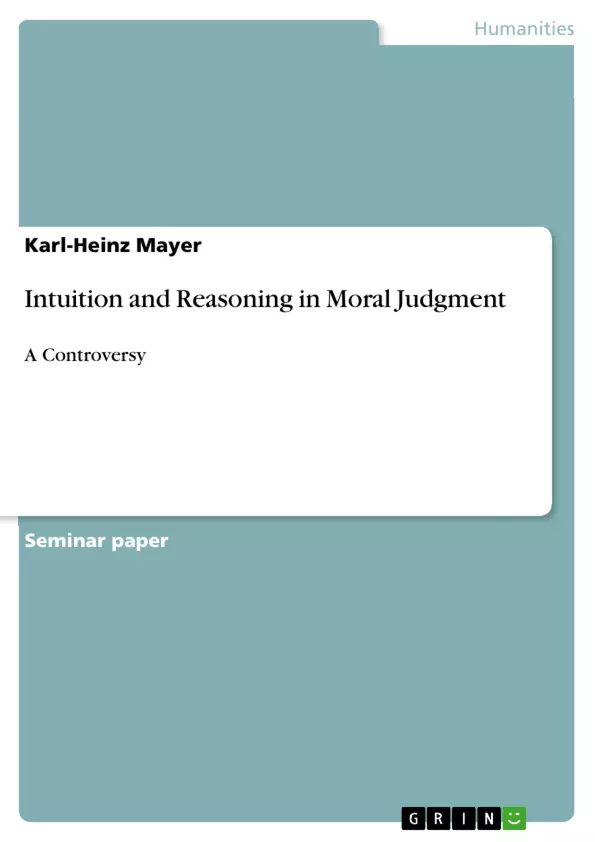This seminar paper is about the balance between intuition and affect on one hand, and conscious reasoning on the other, in moral decisions. The basis for this analysis consists of recent neurobiological and psychological research.
The paper first looks for some input from Neurophysiology to understand what is known about the “wiring” in our brain for moral decisions. Are moral judgments effectuated in the “rational” cortical regions of the brain or in the “intuitive”, affective, and emotional subcortical region?
It then presents a controversy between Jonathan Haidt and Pizarro and Bloom over the predominance of intuition over reasoning in moral judgment. Jonathan Haidt proposes a theory called Social Intuitionist Approach that postulates a priority of intuition over reason, combined with a social component. Moral decisions are predominantly intuitive, he argues, and reason is primarily used to justify the decision afterwards.
Pizarro and Bloom are not fully convinced. While they agree with some parts of Haidt’s theory, they contradict his overall conclusion about the dominance of intuition over reason. In their opinion there is sufficient room for training one’s intuitions and for rationally preparing moral decisions.
Haidt counters the counter-arguments, but concedes that statistical data are missing, which would allow a final assessment of the matter.
Contents
1. Introduction
2. The Neurophysiology of Moral Judgment
3. The Social Intuitionist Approach to Moral Judgment
4. A pertinent controversy
Objections to Haidt (2001) by Pizarro and Bloom
Cognitive Appraisal
Control over the input
Reply by Jonathan Haidt to the objections by Pizarro and Bloom
5. Evaluation of the arguments
6. Philosophical Aspects of the dilemma discussed.
7. Conclusion
8. References:
Frequently Asked Questions
What is the Social Intuitionist Approach to moral judgment?
Proposed by Jonathan Haidt, this approach suggests that moral judgments are primarily intuitive and affective, with conscious reasoning used mainly to justify the decision after the fact.
How does neurophysiology explain moral decisions?
Research investigates whether moral judgments occur in the "rational" cortical regions or the "intuitive" affective subcortical regions of the brain.
What are the main objections by Pizarro and Bloom to Haidt's theory?
They argue that there is significant room for training one's intuitions and that rational preparation plays a larger role in moral decision-making than Haidt suggests.
Can reasoning influence intuitive moral judgments?
According to Pizarro and Bloom, cognitive appraisal and control over the input can shape and educate our moral intuitions over time.
What is the role of affect in moral psychology?
Affect and emotion are seen as immediate drivers of moral evaluation, often preceding logical thought in the decision-making process.
Does Jonathan Haidt concede any points to his critics?
Haidt counters many arguments but acknowledges that more statistical data is needed for a final assessment of the dominance of intuition over reason.
- Quote paper
- Karl-Heinz Mayer (Author), 2013, Intuition and Reasoning in Moral Judgment, Munich, GRIN Verlag, https://www.grin.com/document/304273



